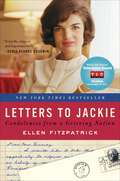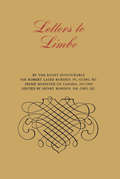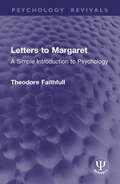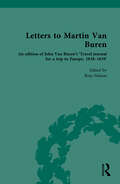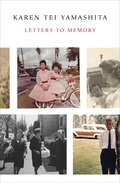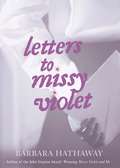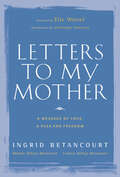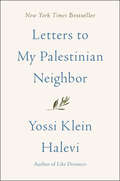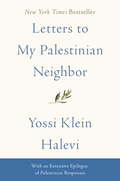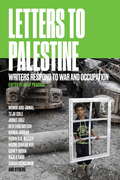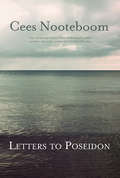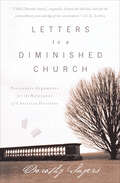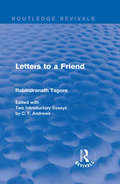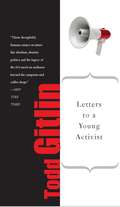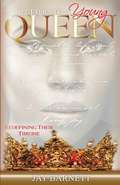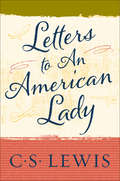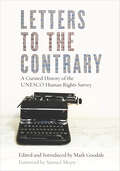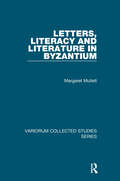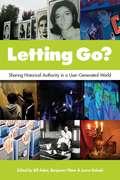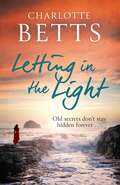- Table View
- List View
Letters to Jackie: Condolences from a Grieving Nation
by Ellen Fitzpatrick“A terrific, original, and important work….Fitzpatrick provides a stunningly fresh look at the impact of JFK’s assassination on the American people.”—Doris Kearns GoodwinFor Letters to Jackie, noted historian and News Hour with Jim Lehrer commentator Ellen Fitzpatrick combed through literally thousands of condolence messages sent by ordinary Americans to Jacqueline Kennedy following the assassination of her husband, President John F. Kennedy, in 1963. The first book ever to examine this extraordinary collection, Letters to Jackie presents 250 intimate, heartfelt, eye-opening responses to what was arguably the most devastating event in twentieth century America, providing a fascinating perspective on a singular time in the history of our nation.
Letters to Limbo
by Henry Borden Robert BordenRobert Laird Borden, Prime Minister of Canada from 1911 to 1920, was born in the village of Grand Pré, Nova Scotia, in 1854. He practiced law in the province before entering politics. In 1896 he was elected to the House of Commons, and in 1901 was chosen leader of the Liberal-Conservative party.After his retirement in 1920, Sir Robert kept on the sidelines of the political debate, although he was often consulted by those in power and was frequently tempted to express his views on current issues. During the last four years of his life, 1933 to 1937, he recorded some of his thoughts and experiences in the form of 'Letters to Limbo.' Some of these he read over and revised, others he left as dictated. The wide range of his interests is revealed in the topics: union government for Canada? / reminiscences of household pets / inaccuracy of the press / bestowal of honours in Canada / business conditions in the United States / Dean of Canterbury and Social Credit / appraisal of Sir Arthur Currie / King Edward VIII and Mrs. Simpson.All the letters but four are presented in this volume. They reveal some of the inner thoughts and strongest beliefs of Sir Robert, giving an insight into the man and his times. Whimsical and humourous, or serious and well-argued, these letters paint a portrait in words of one of the greatest figures in Canadian history.
Letters to Manibahen Patel
by M. K. GandhiThis book is the collection of Letters to Manibahen Patel.
Letters to Margaret: A Simple Introduction to Psychology (Psychology Revivals)
by Theodore FaithfullFirst published in 1941, the original blurb for Letters to Margaret reads: ‘In view of the almost universal ignorance of the most elementary biological and psychological facts of life amongst adults, and waste of time and energy amongst children in attempts to acquire surreptitiously the knowledge necessary to them, the author has supplied the need in this book. Drawing upon a fund of material accumulated over twenty years of work for difficult children, he gives in the form of letters to a girl on the threshold of adolescence answers to many questions which puzzle the eager minds of boys and girls. He traces the course of normal growth from birth to the age of twenty-five, and shows how the male and female elements combine to form the human personality. In a small compass he has given parents and teachers a book which will help children reach maturity ready to take an adult part in life. With this volume on their own shelves children will have no need to search the Bible for stray allusions to the act of reproduction, or borrow surreptitiously the volume on “advice to parents” supposedly kept beyond their reach.’ Today it can be read in its historical context.This book is a re-issue originally published in 1941. The language used and views portrayed are a reflection of its era and no offence is meant by the Publishers to any reader by this re-publication.
Letters to Martin Van Buren: An edition of John Van Buren’s ‘Travel journal for a trip to Europe, 1838-1839’
by Ross NelsonJohn Van Buren's 'Travel journal for a trip to Europe, 1838-1839' is a record of the a year he spent in England, Scotland, Ireland, Belgium and Holland, primarily for his father, Martin Van Buren, the 8th President of the United States. A fly-on-the-wall view of the political and social situation in Europe was invaluable to the President at a highly sensitive moment in Anglo-American relations, and provides a rich and insightful view for historians of the period. Published in its entirety for the first time, Van Buren's objective and good-humoured observations present fresh insights into complex and compelling personalities and relationships on both sides of the Atlantic, providing an invaluable and highly readable resource for scholars and students of the period, as well as for the general reader.
Letters to Memory
by Karen Tei YamashitaAn excursion through the Japanese-American internment using archival materials from the author’s own family. In this unique memoir, Karen Tei Yamashita draws on her family’s history and creates a series of epistolary conversations with composite characters representing a range of academic specialties. Historians, anthropologists, classicists—their disciplines, and Yamashita’s engagement with them, are a way for her explore various aspects of the internment and to expand its meaning beyond her family, and our borders, to ideas of debt, forgiveness, civil rights, and community. From a National Book Award finalist, Letters to Memory is “in moments deeply personal and impressionistic and in moments pulling back into a voice of epic omniscience” (The Boston Globe). “Interrogates the cruelty of internment and the random nature of immigration, war, birth and death and disease through her own probing, lively correspondence . . . The irony and dark humor of Yamashita’s interrogations, of her nimble prose and sentences, illuminate the tragedies.” —Los Angeles Times
Letters to Missy Violet
by Barbara HathawayA heartwarming coming-of-age story set in the rural South. With her friend Missy Violet away in Florida, Viney has big shoes to fill. While there are ailing neighbors to comfort, Viney's favorite teacher has left school--and Viney's irrepressible cousin Charles continues his mischief-making. Through short, powerful vignettes and letters between Missy Violet, Viney, and others, the day-to-day happenings in this warm southern town come to life.
Letters to My Israeli Sons: The Story of Jewish Survival
by Lynne Reid BanksThis is a collection of letters written to his sons in Israel by a father who migrated to Canada as an evacuee.
Letters to My Mother: A Message of Love, A Plea for Freedom
by Ingrid Betancourt Lorenzo Delloye-Betancourt Melanie Delloye-BetancourtCorrespondence between politician Ingrid Betancourt and her family, written while she was being held hostage by a Columbian guerilla group. On December 1, 2007, during the arrest of several guerillas in Bogotá, the Colombian police confiscated a short video clip of political hostage Ingrid Betancourt. Accompanying the video was a twelve-page letter, dated October 24, 2007, written by Betancourt to her mother and family. Kidnapped on February 23, 2002, Betancourt has become an international symbol in the struggle for liberty and the fight against barbarity. Before being captured by the Revolutionary Armed Forces of Colombia (FARC), she was a voice of hope for the Colombian people, leading a courageous fight against political corruption, violence, and illegal detentions. Presented in this small, poignant book is Betancourt&’s letter to her mother printed in English, French, and Spanish. From the depths of the Colombian jungle, Betancourt&’s words are an impassioned declaration of love to those dearest to her. In addition to this letter is a response to Betancourt written by her children who, since they were teenagers, have rallied public support for their mother&’s release. With a preface by Nobel Peace Prize Laureate Elie Wiesel, Letters to My Mother conveys a powerful message of love for family and country, and a heartrending plea for freedom.
Letters to My Palestinian Neighbor
by Yossi Klein HaleviAttempting to break the agonizing impasse between Israelis and Palestinians, the Israeli commentator and award-winning author of Like Dreamers directly addresses his Palestinian neighbors in this taut and provocative book, empathizing with Palestinian suffering and longing for reconciliation as he explores how the conflict looks through Israeli eyes. <P><P>I call you "neighbor" because I don’t know your name, or anything personal about you. Given our circumstances, "neighbor" might be too casual a word to describe our relationship. We are intruders into each other’s dream, violators of each other’s sense of home. We are incarnations of each other’s worst historical nightmares. Neighbors? <P><P>Letters to My Palestinian Neighbor is one Israeli’s powerful attempt to reach beyond the wall that separates Israelis and Palestinians and into the hearts of "the enemy." In a series of letters, Yossi Klein Halevi explains what motivated him to leave his native New York in his twenties and move to Israel to participate in the drama of the renewal of a Jewish homeland, which he is committed to see succeed as a morally responsible, democratic state in the Middle East. <P><P>This is the first attempt by an Israeli author to directly address his Palestinian neighbors and describe how the conflict appears through Israeli eyes. Halevi untangles the ideological and emotional knot that has defined the conflict for nearly a century. In lyrical, evocative language, he unravels the complex strands of faith, pride, anger and anguish he feels as a Jew living in Israel, using history and personal experience as his guide. <P><P>Halevi’s letters speak not only to his Palestinian neighbor, but to all concerned global citizens, helping us understand the painful choices confronting Israelis and Palestinians that will ultimately help determine the fate of the region.
Letters to My Palestinian Neighbor
by Yossi Klein HaleviNew York Times bestseller "A profound and original book, the work of a gifted thinker."--Daphne Merkin, The Wall Street JournalAttempting to break the agonizing impasse between Israelis and Palestinians, the Israeli commentator and award-winning author of Like Dreamers directly addresses his Palestinian neighbors in this taut and provocative book, empathizing with Palestinian suffering and longing for reconciliation as he explores how the conflict looks through Israeli eyes.I call you "neighbor" because I don’t know your name, or anything personal about you. Given our circumstances, "neighbor" might be too casual a word to describe our relationship. We are intruders into each other’s dream, violators of each other’s sense of home. We are incarnations of each other’s worst historical nightmares. Neighbors?Letters to My Palestinian Neighbor is one Israeli’s powerful attempt to reach beyond the wall that separates Israelis and Palestinians and into the hearts of "the enemy." In a series of letters, Yossi Klein Halevi explains what motivated him to leave his native New York in his twenties and move to Israel to participate in the drama of the renewal of a Jewish homeland, which he is committed to see succeed as a morally responsible, democratic state in the Middle East.This is the first attempt by an Israeli author to directly address his Palestinian neighbors and describe how the conflict appears through Israeli eyes. Halevi untangles the ideological and emotional knot that has defined the conflict for nearly a century. In lyrical, evocative language, he unravels the complex strands of faith, pride, anger and anguish he feels as a Jew living in Israel, using history and personal experience as his guide.Halevi’s letters speak not only to his Palestinian neighbor, but to all concerned global citizens, helping us understand the painful choices confronting Israelis and Palestinians that will ultimately help determine the fate of the region.
Letters to Palestine
by Vijay PrashadOperation Protective Edge, Israel's seven-week bombing campaign and ground invasion of Gaza in the summer of 2014, resulted in half a million displaced Gazans, tens of thousands of destroyed homes, and more than 2,000 deaths--and, yet, it was only the latest in a long series of assaults endured by Palestinians isolated in Gaza. But, following the conflict, polls revealed a startling fact: for the first time, a majority of Americans under thirty found Israel's actions unjustified. Jon Stewart aired a blistering attack on Israeli violence, and a video of a UN spokesperson weeping as he was interviewed in Gaza went viral, appearing on Vanity Fair and Buzzfeed, among other sites. This book traces this swelling American recognition of Palestinian suffering, struggle, and hope, in writing that is personal, lyrical, anguished, and inspiring. Some of the leading writers of our time, such as Junot Díaz and Teju Cole, poets and essayists, novelists and scholars, Palestinian American activists like Huwaida Arraf, Noura Erakat, and Remi Kanazi, give voice to feelings of empathy and solidarity--as well as anger at US support for Israeli policy--in intimate letters, beautiful essays, and furious poems. This is a landmark work of controversial, committed literary writing.From the Trade Paperback edition.
Letters to Poseidon
by Cees NooteboomIt is said that during his abortive campaign to invade Britannia, the infamous Roman emperor Caligula ordered his legions into the surf to attack Poseidon and claim seashells as trophies of war. Cees Nooteboom is considerably more thoughtful in his relationship with the god of the sea. As autumn falls each year, Nooteboom writes Poseidon a letter requesting permission to return to his home in Minorca the following spring.Of course, it would be the height of discourtesy if Nooteboom's letters were no more than a series of demands. So Cees takes the opportunity to seek the wisdom of the trident-wielding deity, and to offer the god updates about his own life and thoughts.At once playful and poignant, beautiful and at times slightly bizarre, this masterful exploration of humankind's relationship with the sea uses the minutiae of everyday life to illuminate the broadest questions of human existence, all couched in the lapidary prose of one of Europe's outstanding stylists.
Letters to Sardar Vallabhbhai Patel
by M. K. GandhiThis book is the collection of Letters to Sardar Patel. Translated From The Original Gujarati And edited By Valji Govindji Desai And Sudarshan V. Desai.
Letters to a Diminished Church: Passionate Arguments for the Relevance of Christian Doctrine
by Dorothy L. SayersWhat must a person believe to be a Christian? In this collection of 16 essays, famed author Dorothy L. Sayers discusses why the church desperately needs to refocus on doctrine, as doctrine impacts all of life.In her dynamic and sharp writings, Dorothy L. Sayers turned the popular perception of Christianity on its head. She argues that the essence of Christianity is in the character of Christ—energetic, dramatic, and utterly alive. This collection of sixteen brilliant essays reveals Sayers, at her best—a powerful view of Christianity as startling and relevant as it was 50 years ago.An outspoken defender of Christian orthodoxy, Dorothy L. Sayers discusses Christian theology with brilliance and wit. A British scholar, author, and staunch Christian, Sayers brings theology vividly to life by showing how the Bible, history, literature, and modern science fit together to make religion not only possible but necessary in our time. Each essay is a concise, perceptive examination of the topic at hand. The book:Includes sixteen essays on a variety of topics addressing core beliefs, the image of God, the problem of sin and evil, and morePresents age-old doctrines without prettying them up or watering them downProvides insights into the social and spiritual forces that affect the modern-day cultural shift away from ChristWhether you are reading the great works of Western literature, thinking about your place in God's universe, or simply dealing with the thousand-and-one problems of daily living, this powerful book has words of both challenge and comfort for you."The devil should stand alert, for Sayers is one of his foremost adversaries."
Letters to a Friend (Routledge Revivals)
by Rabindranath TagoreThis title, first published in 1928, is a collection of letters from the Bengali polymath Rabindranath Tagore to C. F. Andrews. The letters have been divided into several chapters, accompanied by introductory notes by Andrews, and provide the reader with an expression of Tagore’s anxiety about modern civilization and political life in India. This book will be of interest to students of history.
Letters to a Young Activist
by Todd Gitlin"Be original. See what happens. " So Todd Gitlin advises the young mind burning to take action to right the wrongs of the world but also looking for bearings, understanding, direction, and practical examples. In Letters to a Young Activist, Todd Gitlin looks back at his eventful life, recalling his experience as president of the formidable Students for a Democratic Society in the '60s, contemplating the spirit of activism, and arriving at some principles of action to guide the passion and energy of those wishing to do good. He considers the three complementary motives of duty, love, and adventure, and reflects on the changing nature of idealism and how righteous action requires realistic as well as idealistic thinking. And he looks forward to an uncertain future that is nevertheless full of possibility, a future where patriotism and intelligent skepticism are not mutually exclusive. Gitlin invites the young activist to enter imaginatively into some of the dilemmas, moral and practical, of being a modern citizen--the dilemmas that affect not only the problems of what to think but also the problems of what to love and how to live.
Letters to a Young Queen: Redefining Their Throne
by Jay BarnettThis book is a collection of letters and poems for young girls. Author Jay Barnett highlights the struggles and triumphs of the young women he has encountered through the Women of Excellence Project. This book is for the fatherless little girl who is desperately seeking male attention and craves the encouragement, discipline, and authority that only a father figure can give. These letters will inspire and empower young girls from all backgrounds to grow into the queens they were destined to be. Women of the 1900’s had many fearless leaders and trailblazers to admire and respect-Amelia Earhart, Helen Keller, Rosa Parks and Eleanor Roosevelt, to name a few. Since then, women have shattered the glass ceiling-landing positions in traditionally male-dominated industries, such as politics, banking and science. Despite this progression, several prominent women in our current culture detract from the progress made thus far. The days of positive female role models are slowly disappearing, as reality stars and entertainers have captured the attention of our young girls. Young women of this generation have lost sight of the numerous sacrifices made to ensure and protect their freedoms and rights. How do we stop the perpetual cycle of uneducated and foolish behaviors of our young women before it’s too late? The Women of Excellence Project is a program dedicated to the mentoring and mental development of young women. Through this work, author Jay Barnett began to see recurring behavior patterns among the young women highlighting their need for acceptance and validation. Even at an early age, young girls want to pursue what is socially accepted. In the absence of positive role models in today’s society, girls imitate reality TV stars and their friends’ behavior on social media. Now is the time to restore young women to their rightful place in society and to build them up into the queens that they truly are.
Letters to an American Lady
by C. S. LewisOn October 26, 1950, C. S. Lewis wrote the first of more than a hundred letters he would send to a woman he had never met, but with whom he was to maintain a correspondence for the rest of his life.Ranging broadly in subject matter, the letters discuss topics as profound as the love of God and as frivolous as preferences in cats. Lewis himself clearly had no idea that these letters would ever see publication, but they reveal facets of his character little known even to devoted readers of his fantasy and scholarly writings—a man patiently offering encouragement and guidance to another Christian through the day-to-day joys and sorrows of ordinary life.Letters to an American Lady stands as a fascinating and moving testimony to the remarkable humanity and even more remarkable Christianity of C. S. Lewis, and is richly deserving of the position it now takes among the balance of his Christian writings.
Letters to the Contrary: A Curated History of the UNESCO Human Rights Survey (Stanford Studies in Human Rights)
by Mark GoodaleThis remarkable collection of letters reveals the debate over universal human rights. Prominent mid-twentieth-century intellectuals and leaders—including Gandhi, T.S. Eliot, W.H. Auden, Aldous Huxley, Jawaharlal Nehru, and Arnold Schoenberg—engaged with the question of universal human rights. Letters to the Contrary presents the foundation of the intellectual struggles and ideological doubts still present in today's human rights debates. Since its adoption in 1948, historians and human rights scholars have claimed that the Universal Declaration of Human Rights was influenced by UNESCO's 1947–48 global survey of intellectuals, theologians, and cultural and political leaders, that supposedly demonstrated a truly universal consensus on human rights. Based on meticulous archival research, Letters to the Contrary provides a curated history of the UNESCO human rights survey and demonstrates its relevance to contemporary debates over the origins, legitimacy, and universality of human rights. In collecting, annotating, and analyzing these responses, including letters and responses that were omitted and polite refusals to respond, Mark Goodale shows that the UNESCO human rights survey was much less than supposed, but also much more. In many ways, the intellectual struggles, moral questions, and ideological doubts among the different participants who both organized and responded to the survey reveal a strikingly critical and contemporary orientation, raising similar questions at the center of current debates surrounding human rights scholarship and practice. This volume contains letters and survey responses from Jacques Havet, Jacques Maritain, Arnold J. Lien, Richard P. Mckeon, Quincy Wright, Levi Carneiro, Arthur H. Compton, Charles E. Merriam, Lewis Mumford, E. H. Carr, John Lewis, Harold J. Laski, Serge Hessen, John Somerville, Boris Tchechko, Luc Somerhausen, Hyman Levy, Ture Nerman, R. Palme Dutt, Maurice Dobb, Pierre Teilhard De Chardin, Marcel De Corte, Pedro Troncoso Sánchez, Mahatma Gandhi, Chung-Shu Lo, Kurt Riezler, Inocenc Arnošt Bláha, Hubert Frère, M. Nicolay, W. Albert Noyes, Jr., Aldous Huxley, Ralph W. Gerard, Johannes M. Burgers, Humayun Kabir, A. P. Elkin, S. V. Puntambekar, Leonard Barnes, Benedetto Croce, Jean Haesart, F. S. C. Northrop, Peter Skov, Emmanuel Mounier, Maurice Webb, John Macmurray, Julius Moór, L. Horváth, Alfred Weber, Don Salvador De Madariaga, Frank R. Scott, Jawaharlal Nehru, Margery Fry, Isaac Leon Kandel, René Maheu, Albert Szent-Györgyi, Morris L. Ernst, Arnold Schoenberg, W. H. Auden, Melville Herskovits, Theodore Johannes Haarhoff, Ernest Henry Burgmann, Herbert Read, and T. S. Eliot.
Letters to the Galatians and Ephesians (The Daily Study Bible Revised Edition)
by William BarclayCommentary on the letters to the Galatians and Ephesians.
Letters, Literacy and Literature in Byzantium (Variorum Collected Studies #889)
by Margaret MullettThese studies look at general problems of reading Byzantine literature, at literacy practices and the literary process, but also at individual texts. The past thirty years have seen a revolution in the way Byzantine literature has been viewed: no longer is it considered a decadent form of classical literature or a turgid precursor of modern Greek literature. There are still prejudices to overcome: that there was no literary public, or that Byzantium had no drama or humour, but Byzantine texts are now read as literature in the social context of literacy and book culture. One genre is treated here more fully: the letter (Derrida said that letters represent all literature). In these studies epistolography is examined from the point of view of genre, of originality, of communication and as evidence for political history. Other genres touched on include the novel, historiography, parainesis, panegyric, and hagiography. The section on literary process includes essays on genre, patronage and rhetoric, and the section on literacy practices deals with both writing and reading. The collection includes one unpublished lecture which acts as introduction, and additional notes and comments.
Letting Go?: Sharing Historical Authority in a User-Generated World
by Bill Adair Benjamin Filene Laura KoloskiLetting Go? investigates path-breaking public history practices at a time when the traditional expertise of museums seems challenged at every turn--by the Web and digital media, by community-based programming, by new trends in oral history and by contemporary art. In this anthology of 19 thought pieces, case studies, conversations and commissioned art, almost 30 leading practitioners such as Michael Frisch, Jack Tchen, Liz Sevcenko, Kathleen McLean, Nina Simon, Otabenga Jones and Associates, and Fred Wilson explore the implications of letting audiences create, not just receive, historical content. Drawing on examples from history, art, and science museums, Letting Go? offers concrete examples and models that will spark innovative work at institutions of all sizes and budgets. This engaging new collection will serve as an introductory text for those newly grappling with a changing field and, for those already pursuing the goal of "letting go," a tool for taking stock and pushing ahead.
Letting in the Light (The Spindrift Trilogy)
by Charlotte BettsFrom the award-winning author of The Apothecary's Daughter comes the next book in the Spindrift Trilogy - a beautifully evocative, family drama, perfect for fans of Santa Montefiore, Lucinda Riley and Elizabeth Jane Howard's Cazalet Chronicles.1914 Spindrift House, CornwallEdith Fairchild's good-for-nothing husband, Benedict, deserted her when their children were babies. Now the children are almost adult, Edith and Pascal, her faithful lover of two decades, are planning to leave their beloved Spindrift artists' community and finally be together.But an explosive encounter between Benedict and Pascal forces old secrets into the light, causing rifts in the happiness and security of the community. Then an assassin's bullet fired in faraway Sarajevo sets in motion a chain of events that changes everything. Under the shadow of war, the community struggles to eke out a living. The younger generation enlist or volunteer to support the war effort, facing dangers that seemed unimaginable in the golden summer of 1914.When it's all over, will the Spindrift community survive an unexpected threat? And will Edith and Pascal ever be able to fulfil their dream?Why do readers love Charlotte Betts?'Romantic, engaging and hugely satisfying' Katie Fforde'A highly-recommended novel of love, tragedy and the power of art' Daily Mail'Beautifully written, engaging and heart-warming' Book Club Mumma'A highly compelling, engrossing read' Discovering Diamonds'Evocative, enthralling and enjoyable' Bookish Jottings'Poignant, compelling and extensively researched . . . I cannot wait to find out what happens next to these characters' Sarah's Vignettes'A delightful historical saga which is so beautifully woven together that from the very start I was enchanted' Jaffa Reads Too'Rich in detail, full of passion this is a delightful and fascinating read' Book Literati
Letting in the Light (The Spindrift Trilogy)
by Charlotte BettsFrom the award-winning author of The Apothecary's Daughter comes the next book in the Spindrift Trilogy - a beautifully evocative, family drama, perfect for fans of Santa Montefiore, Lucinda Riley and Elizabeth Jane Howard's Cazalet Chronicles.1914 Spindrift House, CornwallEdith Fairchild's good-for-nothing husband, Benedict, deserted her when their children were babies. Now the children are almost adult, Edith and Pascal, her faithful lover of two decades, are planning to leave their beloved Spindrift artists' community and finally be together.But an explosive encounter between Benedict and Pascal forces old secrets into the light, causing rifts in the happiness and security of the community. Then an assassin's bullet fired in faraway Sarajevo sets in motion a chain of events that changes everything. Under the shadow of war, the community struggles to eke out a living. The younger generation enlist or volunteer to support the war effort, facing dangers that seemed unimaginable in the golden summer of 1914.When it's all over, will the Spindrift community survive an unexpected threat? And will Edith and Pascal ever be able to fulfil their dream?Why do readers love Charlotte Betts?'Romantic, engaging and hugely satisfying' Katie Fforde'A highly-recommended novel of love, tragedy and the power of art' Daily Mail'Beautifully written, engaging and heart-warming' Book Club Mumma'A highly compelling, engrossing read' Discovering Diamonds'Evocative, enthralling and enjoyable' Bookish Jottings'Poignant, compelling and extensively researched . . . I cannot wait to find out what happens next to these characters' Sarah's Vignettes'A delightful historical saga which is so beautifully woven together that from the very start I was enchanted' Jaffa Reads Too'Rich in detail, full of passion this is a delightful and fascinating read' Book Literati
